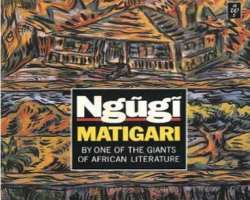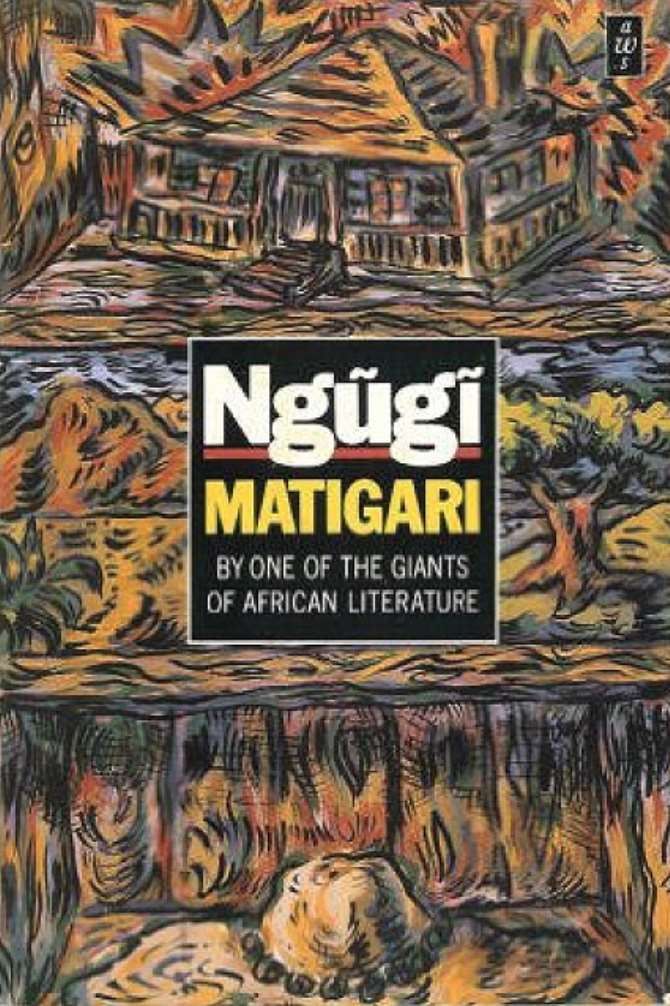Why Matigari is Adapted into a Film but not any other Book by Ngugi

Ask any Kenyan reader about books byNgugi waThiongi’o, the answer you will get will possibly not mention Matigari. The book Matigari, isa long prose and fiction by Ngugi, he wroteit during the era of Moi’s dictatorship in Kenya. This was also the time Ngugi was undergoing social hardships as a newly exiled revolutionary intellectual from a country weighed-down with brutal burden of post-colonial dictatorship. But against all odds, odds in in form of trial-some political and economic experiences of the time, Ngugi still buckled-up to write a Gikuyu version of Matigari then later on translated to English by Wangui wa Goro.
The book, Matigari got published in 1987, but immediately it was was out, it got subjected to irrational censure by the Kenya government to an extent of getting classified as un-wanted book.Thus Matigari was not allowed to circulate to the public like other previous books by Ngugi. This was also the time academic and intellectualculture was being suffocated by the system of politics given that all the public universities in Kenya had been ordered to report to Mulu Mutisya and Ezekiel Barngetuny, the two top and key leaders of KANU, a political party in power at that time. ThusMatigari the book was born at the time when politics in Kenya was mercilessly persecuting art, literature and intellect for no other reason but out of irrational fear which had then gripped those enjoying the oppressive executive power.
Surprisingly, it was recently revealed in Kigali, Rwanda that Ngugi’s novel Matigari is being adapted to a film by Nollywood director Kunle Afolayan. The adaptation will be done as a collaboration and a co-production with the South African as well as Kenyan filmmakers. This was during the Annual festival of Africa Movie Academy Awards (AMAAs) in Kigali, Rwanda. This is damn good news coming after three decades since Matigari was written. Filming of Matigari looks like a story in the bible when god promises to make one’s enemies his footstool before one can reign. The analogy is that those that censured Matigari are a now a footstool on which Matigari is sitting to reign. What I mean is that filming Matigari will increase the the level audience, the readers, the viewers and the size of the fan-dom. Presence of Matigari on YouTube will magnify its availability and flexibility in regard to its consumption. In this regard therefore, the only silent prayers are that let the filming come along with both the visual book and the audio-book.
Why Matigari? The blurb on the back-flap of Matigari’s cover-jacket states that Matigari is a fabulous freedom fighter who emerges from the forest in post-independence Kenya. The emergence of Matigari inspires the birth of a nationwide fear and suspicion, until all those in power had just but a plethora of questions; who is Matigari? Is he young or old; a man or fate; dead or living… or even a resurrection of Jesus Christ? These are the questions asked by the people in the unnamed country that Matigari happened to materialize. The fountain of fear hinges on an obvious political psychology that when a self-less man who has survived the war for independence emerges from the mountains and starts making strange claims and demands, in search of his family to rebuild his home and start a new and peaceful future, those in power fear that the man might convert the search into a quest for truth and justice, especially when he finds the people still dispossessed and the land he loves ruled by corruption, fear, and misery. The blurb also narrates that the emergence of Matigari the man let to the rumoursspringing up that a man with superhuman qualities has risen to renew the freedom struggle.
The blurb denotes that the novel races toward its climax as Matigari realizes that words alone cannot defeat the enemy. He vows to use the force of arms to achieve his true liberation. Matigari is a satire on the betrayal of human ideals and on the bitter experience of post-independence African society.
Matigari is not the only prose or fiction by Ngugi, others are Upright Revolution, Wizard of the Crow, Petals of blood,Devils on the Cross, the River Between and the Grain of Wheat. Thus, the questions is this; why did Kunle Afolayan chose Matigari for filming. These are also the questions that critics often ask about filming of Salman Rushdie’s Midnight’s Children but not any other book by Rushdie.
At the ceremony in Rwanda Kunle Afolayan justified his choice arguing that he is ‘adapting Matigari into a film because Ngugi wa Thiongi’o is Wole Soyinka of Kenya’. Unfortunately, such an argument is devoid of logic and hence it gives not intellectual justification for filming of Matigari.
One can infer a lesson from Ngugi’s prophetic poem as a preface in Matigari. He addressed the poem to the reader and the listener to the story of Matigari. He sang thatMatigari is not story of a specific time, specific place, specific person nor specific year. The reader and listener are free to put it in any era, place, space and history.
And truly, Africa’s poor and the ruledstill need the spirit of Matigari to gird them with required fibre of energy, to stand up and challenge those that want to rule by suffocating democracy, suppressing women, promoting poverty among children , brutalizing the voices of dissent and manoeuvring around to put themselves in dynastic like life-long power.
Alexander Opicho writes from Lodwar, Kenya - [email protected]

